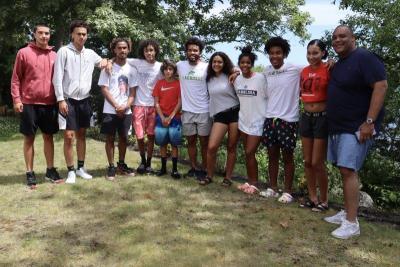Drawing parallels between Black Lives Matter and Civil Rights activists of the 1960s
On June 6, Wendell McCain and his sons, Davis and Charles, joined with hundreds of other protesters in Wareham to march to the police station in support of the Black Lives Matter movement.
For the McCain family, protesting for civil rights is nothing new.
Wendell’s father, Franklin McCain, was one of the original Greensboro Four who staged a sit-in at the Woolworth whites-only lunch counter in Greensboro, North Carolina, on February 1, 1960.
McCain, along with fellow black college students David Richmond, Ezell Blair Jr. (Jibreel Khazan), and Joe McNeil, stayed at the store until it closed that night.
By Feb. 7, thousands of protesters had gathered in the city -- some against segregation, and others for it.
While much has changed since his father’s protest, McCain said that black people in America today are still faced with many of the systemic challenges and forms of oppression that existed decades ago.
“Unfortunately, I’ve been watching this movie for 50 years,” he said.
Despite the length of time between the two movements, McCain noted that they are incredibly similar.
Both movements focus on systemic racism and injustice and have been spearheaded by young people.
The Greensboro Four were 17 years old at the time of their historic sit-in.
On June 6 of this year, the Black Lives Matter march from the Onset Pier to the Wareham Police Station was organized by 18-year-old Jazzy Andrade.
McCain attributed this to the “boundless hope” that people around that age often possess and their belief that they truly are capable of making a difference in the world.
Both his father’s protest against segregation and the demonstrations held after the death of George Floyd grew exponentially over short periods of time, and extended well beyond their initial starting points.
McCain also noted two significant differences between the movements.
For his father, McCain said the “enemy” was clear and present. In the 1960s, activists directly fought against Jim Crow laws that segregated black people and denied them from having the same opportunities as white Americans.
That legal system may not be in place today, but black people in America are still affected by racial disparities in healthcare, education, wealth, and the criminal justice system.
Although racism and oppression may be more nuanced now, McCain said “you know it’s there.” He has been pulled over by police for no reason on multiple occasions.
The other key difference is social media, which has made it easier to spread information and organize protests with like minded people.
McCain said that the advance in technology has allowed demonstrations to be organized more instantaneously than was possible through traditional mediums like newspapers or television. He added that the use of the cell phone video has become pivotal, as it can document injustice in real time.
During the protest in Wareham, tension rose when Police Chief John Walcek refused to kneel with the protesters.
McCain took that moment to stand up and address the crowd. He said he chose to speak up to try to deescalate the situation because he did not want the rash actions of one or two protesters to overshadow the hours of peaceful demonstrations that took place that day.
After sharing his story with the crowd, tensions eased, and the protest ended without incident.
McCain’s sons Davis and Charles McCain participated in the March from the Onset Pier to the police station.
One lesson that McCain said he wants to pass on from his father to his sons and their peers is that “if you want to start a revolution, you can’t wait for the masses, you’ve got to go do it.”
McCain met his wife Lori, who is from Onset, while they were both working in New York. McCain and his family live in North Carolina, but have a summer home in Wareham.
She said she is happy that her sons are able to spend time in her hometown, as it allows them to stay connected to their Cape Verdean heritage.
McCain paid tribute to his wife’s birthplace by naming his financial company “Onset Capital Partners.” The company continues McCain’s father’s legacy by specializing in helping minority owned businesses and banks.
He said that he feels that his work is important because many (though not all) of the systemic issues black people are affected by could be improved upon if African Americans had more access to wealth and economic opportunities.
















